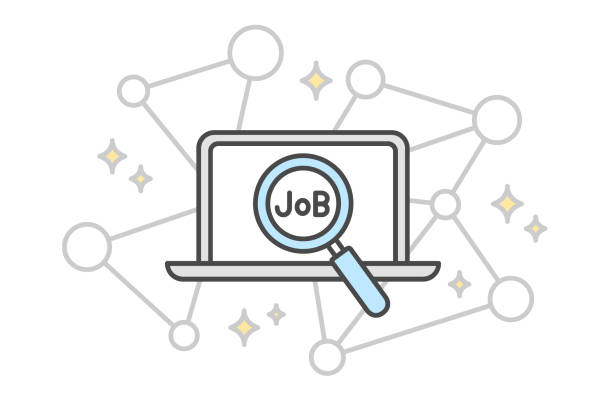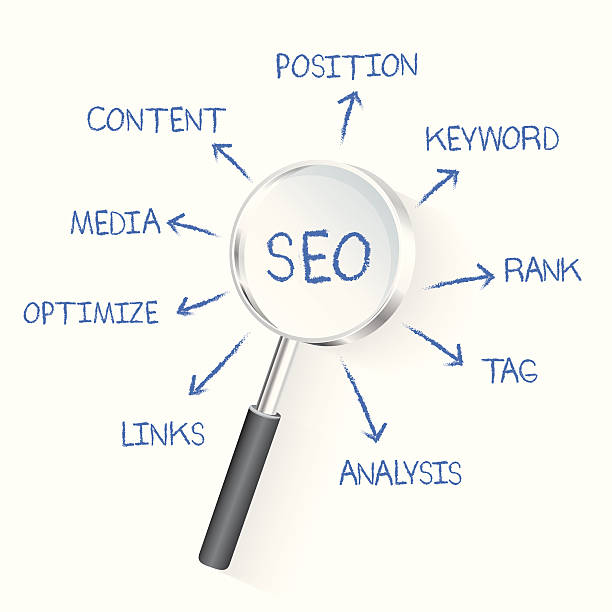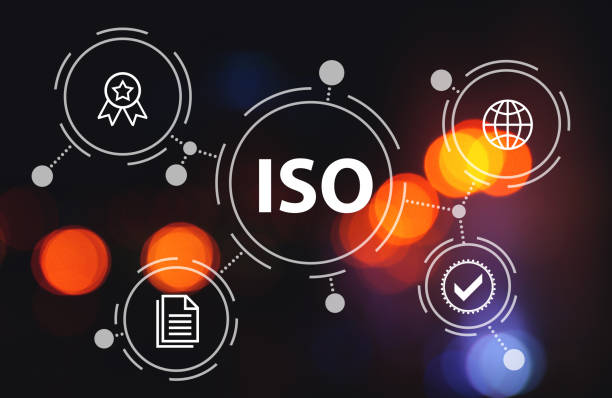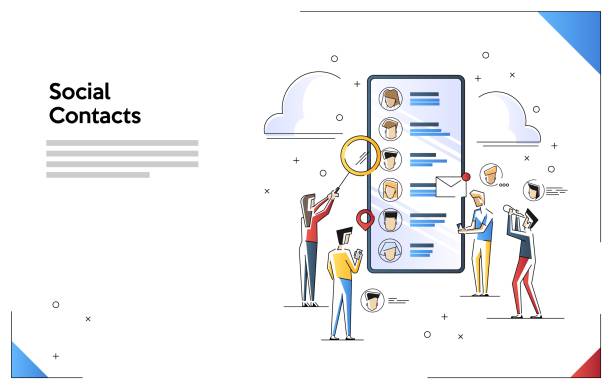Introduction to Off-Page SEO and Its Role in Online Success

Off-page SEO, also known as #Off-site_Optimization, refers to a set of actions performed outside your website to improve its ranking in search engine results.
Unlike on-page SEO, which focuses on content and internal site structure, these actions primarily concentrate on gaining #credibility and #authority from external sources.
At the core of off-page SEO is the concept of backlinks; links from other websites to your site, which are considered by search engines as a “vote of confidence” or “recommendation” for your content.
The more reputable and relevant these backlinks are, the more valuable they will be, sending stronger signals to search engines.
The main goal of off-page SEO is to increase your Domain Authority and Page Authority, which directly impacts your target keyword rankings.
Beyond backlinks, other activities such as brand mentions, social signals (likes, shares, comments), and even online citations (without direct links) can contribute to strengthening your off-page SEO profile.
This aspect of site optimization is often time-consuming and requires a long-term strategy, but its results in improving your position in search results will be very significant.
In fact, without a strong off-page SEO strategy, even the best on-page SEO might not be able to push your site to the top rankings, as online competition is fierce, and external credibility is a key distinguishing factor.
Are visitors leaving your e-commerce site before making a purchase? Don’t worry anymore! With Rasaweb’s professional e-commerce website design services, solve the problem of visitor-to-customer conversion for good!
✅ Significant increase in conversion rates and sales
✅ Exceptional and engaging user experience
⚡ Contact us now for a free consultation!
Why Backlinks Are the Backbone of Off-Page SEO?

Backlinks, also known as inbound links or external links, are undoubtedly the most crucial factor in any off-page SEO strategy.
From the perspective of search engines like Google, each backlink signifies a vote of confidence from another website for your content.
This vote of confidence indicates that your content is valuable, authoritative, and trustworthy.
The greater the number and quality of these “votes,” the more credibility search engines will grant your website, recognizing it as an authoritative source in its field.
This credibility directly leads to an increase in your site’s ranking in search results.
The importance of backlinks goes beyond mere quantity; backlink quality plays a more vital role.
A backlink from a website with high domain authority, relevant to your field, and with high traffic is far more valuable than dozens of backlinks from spammy or irrelevant sites.
This is due to Google’s complex algorithms, which can distinguish natural and valuable links from artificial or low-value ones.
Your link profile (i.e., the collection of all inbound backlinks) is, in a way, your website’s credential on the internet.
A healthy and robust link profile, built through targeted off-page SEO activities, not only improves your ranking but also increases user trust and credibility in your brand, bringing stable organic traffic.
A deep understanding of this mechanism is essential for anyone seeking success in SEO.
Types of Backlinks and Criteria for a High-Quality Backlink

In the world of off-page SEO, understanding the types of backlinks and their quality criteria is highly important.
Backlinks are mainly divided into two main categories: DoFollow and NoFollow.
DoFollow links allow search engines to transfer “power” and “authority” from the source website to the destination website, making them highly valuable for SEO.
In contrast, NoFollow links typically do not pass authority, but they can still be useful for driving traffic and diversifying your link profile.
Examples of NoFollow links include comments, forums, and some social media platforms.
However, regardless of whether it’s DoFollow or NoFollow, the quality of a backlink depends on several factors:
- Domain Authority (DA) of the source site: The more authoritative and strong the website linking to you, the higher the value of that link.
- Topical Relevance: A link from a site relevant to your field of activity is far more valuable than from an irrelevant site.
- Link Placement on the page: Links placed within the main content and higher up on the page usually have a greater impact than footer or sidebar links.
- Anchor Text: The text on which the link is placed should be relevant and natural.
- Link Naturalness: The link should not appear spammy or artificial.
Diversity in anchor text and linking sources is important. - Traffic and Page Authority (PA) of the linking page: The page linking to you should itself have good authority and traffic.
These criteria help you focus on the quality of backlinks rather than solely on quantity in your off-page SEO strategies.
The table below briefly outlines the important criteria for a high-quality backlink:
| Criterion | Description | Importance (1 to 5) |
|---|---|---|
| High Domain Authority (DA) | A link from reputable and well-known websites | 5 |
| Topical Relevance | The content of the linking site is relevant to your site | 4 |
| Contextual Placement | Link within the main content and relevant to it | 4 |
| Relevant and Diverse Anchor Text | Link text relevant to the destination page, not just the keyword | 3 |
| Page Traffic and Views | The linking page itself has visitors | 3 |
Effective Link Building Strategies in Off-Page SEO

Link Building is one of the most challenging yet highly rewarding aspects of off-page SEO.
This process requires a strategic, ethical, and creative approach.
Here are some of the most effective strategies you can employ to strengthen your link profile:
- Content Marketing: Creating valuable, unique, and high-quality content that is naturally referenced and linked to by other websites is the best way to earn backlinks.
This content can include in-depth articles, infographics, case studies, videos, and free tools. - Broken Link Building: This strategy involves finding broken links on reputable websites and then suggesting your similar content to replace the broken link.
It’s a win-win approach; you gain a backlink, and the website owner fixes a broken link. - Competitor Analysis: By analyzing your competitors’ link profiles, you can identify new opportunities to acquire backlinks.
Tools like Ahrefs or Semrush help you see where competitors are getting their links. - Guest Posting: Writing high-quality articles for other relevant websites and placing a link to your site within that article or author bio.
This method, in addition to link building, also helps increase brand awareness. - Submitting to Reputable Directories and Listings: Submitting your site to specialized and reputable directories in your field of activity.
You should avoid spammy and general directories. - Digital PR: Creating newsworthy or viral content that is published by media outlets and news websites, linking back to you.
Always remember that focusing on the quality, naturalness, and topical relevance of links is more important than their quantity.
Google strongly combats artificial and spammy links, so “black hat” strategies can severely damage your site’s ranking.
Consistency and patience in this process are key to success.
Are you tired of your e-commerce website not generating as much revenue as it could? Rasaweb, specializing in professional e-commerce website design, solves this problem permanently!
✅ Increased sales rate and revenue
✅ High loading speed and unparalleled user experience
⚡ Get a free e-commerce website design consultation
The Importance of Anchor Text and Its Optimization

Anchor Text refers to the clickable text that contains a hyperlink.
This text provides an important signal to search engines, helping them understand the topic of the linked page.
Optimizing anchor text is a crucial part of your off-page SEO strategy, as it can significantly impact the ranking of specific keywords.
There are various types of anchor text, each with its own role and application:
- Exact Match Anchor Text: Exactly the keyword for which the destination page ranks.
(Example: “Off-page SEO”) - Partial Match Anchor Text: Includes the target keyword along with other words.
(Example: “best off-page SEO guide”) - Branded Anchor Text: Includes your brand name.
(Example: “Website X”) - Naked URL Anchor Text: The URL itself is used as the anchor text.
(Example: “https://example.com”) - Generic Anchor Text: Words like “click here” or “read more”.
The important point in optimizing anchor text is its diversity and naturalness.
Excessive use of exact match anchor text can be considered “over-optimization” and penalized by Google.
Google looks for a natural link profile, where anchor texts are diverse and users link to your content in various ways.
The best approach is to use a combination of anchor text types, focusing on naturalness and relevance to the content of both the linking page and the destination page.
Every backlink you acquire for off-page SEO should have anchor text that provides both the user and the search engine with a correct understanding of the destination page’s content.
Social Signals and Brand Mentions in Off-Page SEO

Alongside backlinks, social signals and brand mentions are also considered important elements in off-page SEO strategies, although their direct impact on ranking might be less than that of backlinks.
Social signals refer to activities such as likes, shares, comments, and the level of engagement with your content on various social media platforms.
Although Google has not directly stated that Facebook likes or Twitter retweets act as direct ranking factors, these signals can indirectly influence SEO.
Firstly, increased visibility and brand awareness on social media can lead to more traffic to your website and, consequently, an increased chance of acquiring natural backlinks.
The more your content is shared and seen, the higher the likelihood that bloggers, journalists, or other experts will link to it.
Secondly, Brand Mentions, even without direct links, can also help strengthen your online credibility and authority.
Google looks for signs of a brand’s popularity and credibility across the web.
When your brand name is frequently mentioned on news websites, blogs, review platforms, or forums, this signals to Google that you are a real and recognized entity.
These indicators, especially when combined with other off-page SEO factors, can help search engines identify your website as a credible and trustworthy source.
Therefore, being active on social media and encouraging users to interact with your content is an integral part of a comprehensive off-site optimization strategy.
These activities indirectly pave the way for continuous SEO improvement.
Guest Blogging and Outreach Approaches

Guest Blogging is one of the most effective strategies in off-page SEO, allowing you to publish your content on other websites and, in return, receive one or more backlinks to your site.
This method not only helps you acquire high-quality links but also leads to increased brand awareness and referral traffic.
The key to successful guest blogging is finding relevant and reputable websites that have your target audience and are also strong in terms of SEO metrics.
The guest blogging process usually begins with “Outreach”.
Outreach refers to establishing contact with website owners, editors, or content managers to explore collaboration opportunities.
This communication can be done via email, social media, or contact forms.
In your outreach message, you should clearly demonstrate what value you can add to their audience and why your content is suitable for them.
Proposing unique and high-quality article ideas significantly increases your chances of success.
The main steps for effective guest blogging and outreach in off-page SEO are as follows:
- Finding Opportunities: Searching for websites in your niche that accept guest posts.
(By searching phrases like “write for us” + “your keyword”). - Research and Analysis: Examining the domain authority, traffic, relevance, and content quality of candidate websites.
- Personalized Outreach: Sending personalized emails, not generic templates, to show you have researched their website.
- Proposing Engaging Ideas: Offering several high-quality article ideas that would be appealing to their audience.
- Writing Quality Content: Once accepted, writing an excellent article that meets the host website’s standards and adds real value.
- Natural Link Placement: Including a link to your website naturally and relevantly within the article text or author’s biography.
This approach not only helps increase your off-page SEO authority but also expands your reach to new audiences and strengthens your brand online.
| Step | Description | Useful Tools |
|---|---|---|
| 1. Identify Goals |
Define keywords, target audience, and types of target sites | Google Search, Semrush, Ahrefs |
| 2. Find Relevant Websites |
Search for high-authority sites that accept guest posts | Exploding Topics, BuzzSumo |
| 3. Competitor Analysis |
Review competitors’ backlinks and identify recurring opportunities | Ahrefs, Moz Link Explorer |
| 4. Outreach and Communication |
Create personalized messages to propose collaboration | Hunter.io, Mailshake |
| 5. Content Creation and Link Building |
Write high-quality articles and include natural links | Grammarly, Hemingway App |
| 6. Follow-up and Relationships |
Follow up after submission and maintain relationships with webmasters | CRM Tools |
Negative SEO and Ways to Protect Your Link Profile

In the competitive world of SEO, besides striving to improve your own position, you must also be wary of Negative SEO attacks.
Negative SEO refers to a set of unethical tactics that competitors or malicious individuals might employ to harm your website’s ranking in search results.
The most common form of negative SEO is creating spammy and low-quality links to your website.
These links usually come from irrelevant sites, with spammy content, or from suspicious link networks, and their goal is to send negative signals to Google and diminish your credibility.
Detecting and countering negative SEO is a crucial component of off-page SEO management.
Although Google has made significant progress in identifying and disregarding spammy links, some of these attacks might still have a negative impact on your ranking.
To protect your link profile, the following actions are essential:
- Continuous Monitoring of Your Link Profile: Regularly use tools like Google Search Console, Ahrefs, or Semrush to review new and suspicious backlinks.
Look for sudden spikes in the number of links from irrelevant sites, strange anchor texts, or links from domains with low DA/PA. - Google’s Disavow Tool: If you identify spammy and malicious links clearly intended to harm you, you can use Google’s Disavow tool in Search Console.
By doing this, you inform Google to disregard these links and not associate them with your site.
This tool should be used with caution and only when necessary, as improper use can harm your site. - Creating Quality Content and Building Natural Links: The best defense is a good offense.
By focusing on producing excellent content and acquiring natural, high-quality links, you can strengthen your link profile sufficiently so that negative SEO attacks cannot significantly impact it.
Vigilance and timely action against negative SEO can protect your website from ranking drops and potential Google penalties, ensuring the stability of your position in search results.
Did you know that 94% of users’ first impressions of a business are related to its website design? With professional corporate website design by **Rasaweb**, turn this initial impression into an opportunity for growth.
✅ Attracting more customers and increasing sales
✅ Building credibility and trust in the audience’s eyes⚡ Get a free website design consultation!
Measuring Success in Off-Page SEO Campaigns

After implementing off-page SEO strategies, measuring and analyzing the results is essential to understand the effectiveness of your efforts and make necessary optimizations.
Success in off-page SEO isn’t just about acquiring a large number of backlinks; it means a noticeable improvement in key metrics that help your site’s ranking and visibility in search engines.
Here are some of the most important Key Performance Indicators (KPIs) that should be monitored:
- Increase in Referring Domains: The number of unique websites that have linked to you.
This metric is more important than the total number of backlinks, as it indicates the diversity and breadth of linking sources. - Increase in Domain Authority/Page Authority: These metrics, calculated by tools like Moz or Ahrefs, indicate the overall strength and authority of your site and its pages.
Their increase signifies an improvement in your link profile. - Organic Traffic: The ultimate goal of SEO is to increase inbound traffic from search engines.
If your off-page SEO campaigns are successful, you should see an increase in organic traffic to your target pages. - Keyword Rankings: Progress in the ranking of your target keywords in search results is a direct indicator of off-page SEO effectiveness.
Rank tracking tools can monitor these changes. - Anchor Text Distribution: Reviewing the diversity and naturalness of acquired anchor texts to ensure no over-optimization and maintain a natural link profile.
- Link Velocity: Monitoring the rate of new backlink acquisition.
A consistent and natural rate is better than a sudden and abnormal increase.
By using tools like Google Search Console, Google Analytics, Ahrefs, Semrush, and Moz, you can monitor these metrics and generate regular reports.
Analyzing this data will help you identify the strengths and weaknesses of your off-page SEO strategy and take steps for its continuous improvement.
The Future of Off-Page SEO and Upcoming Trends

The world of SEO is constantly evolving, and off-page SEO is no exception.
With the advancement of search engine algorithms and artificial intelligence, past approaches may no longer be as effective, and new trends are emerging.
It is predicted that the future of off-page SEO will increasingly focus on quality, authority, and brand relevance.
One of the most important upcoming trends is a greater emphasis on the E-E-A-T concept (Experience, Expertise, Authoritativeness, Trustworthiness).
Google is increasingly looking for sources that not only produce quality content but also possess real expertise, authority, and trustworthiness.
This means that backlinks from reputable and highly specialized sources will become twice as important.
Instead of focusing on a large number of links, acquiring links from well-known websites and individuals in your field will become a priority.
Furthermore, the role of Brand Building and brand mentions (without links) in strengthening off-page SEO will become more prominent.
Google, using AI and natural language processing, can understand semantic relationships and brand reputation across the web.
This means that Digital PR activities, collaborations with influencers, and creating viral content that leads to discussions and mentions of your brand will be more crucial than ever.
Reduced reliance on exact keyword anchor texts and a focus on natural and contextual links, as well as the growth of NoFollow links that can still bring traffic and positive signals, are other important trends.
Ultimately, a holistic approach to off-page SEO, which includes integrating off-page strategies with on-page and technical aspects, will be key to future success.
Consistency, naturalness, and a focus on providing real value will remain constant and lasting principles in this field.
Frequently Asked Questions
| Row | Question | Answer |
|---|---|---|
| 1 | What is Off-Page SEO? | Off-page SEO refers to a set of actions performed outside your website to improve its ranking in search engines. These actions include backlink building, social media presence, branding, and so on. |
| 2 | Why is Off-Page SEO highly important? | Off-page SEO signals to search engines that your website is authoritative, popular, and trustworthy. High-quality backlinks from reputable sites are strong signals for better ranking and help increase your domain authority. |
| 3 | What are the most important components of Off-Page SEO? | The most important components of Off-page SEO include: Link Building, Content Marketing, Social Media Marketing, Influencer Marketing, and Online Reputation Management. |
| 4 | What is a backlink and why is it important for Off-Page SEO? | A backlink is a link that points from another website to your website. These links act as a “vote of confidence” from Google’s perspective and indicate the credibility of your content. The higher the number and quality of backlinks, the better your site’s ranking will be. |
| 5 | What are the types of backlinks in terms of SEO impact? | The two main types of backlinks are DoFollow and NoFollow. DoFollow backlinks pass authority (Link Juice) and directly affect rankings. NoFollows do not pass authority but can still generate traffic and help make the link profile appear natural. (Also UGC and Sponsored) |
| 6 | How can high-quality backlinks be created for your site? | To build high-quality backlinks, methods such as: creating excellent and shareable content, Guest Posting on relevant and reputable sites, Broken Link Building, Digital PR, and analyzing competitor backlinks can be used. |
| 7 | What are Toxic Backlinks and how do they affect a site? | Harmful or spam backlinks are links that point to your site from low-quality, spammy, or irrelevant websites. These backlinks can damage your site’s ranking and even lead to penalties by Google’s algorithms. |
| 8 | What is the role of social media in Off-Page SEO? | Although social signals (likes, shares, etc.) are not direct ranking factors, they assist off-page SEO. They increase content visibility, drive direct traffic to the site, and ultimately boost the chances of acquiring natural backlinks and improving brand recognition. |
| 9 | What is the importance of diversity in a backlink profile? | Diversity in a backlink profile means that your links come from various sources (blogs, forums, news sites, directories), with diverse anchor texts, and with a mix of DoFollow and NoFollow links. This diversity signals to Google that your link building is natural and organic. |
| 10 | What are common mistakes in Off-Page SEO that should be avoided? | Common mistakes include: buying backlinks in large volumes from low-quality sources, over-optimizing with target keywords, neglecting quality over quantity in backlink building, lack of diversity in the link profile, and ignoring harmful backlinks and failing to disavow them. |
And other services of Rasaweb Advertising Agency in the field of advertising
Smart Digital Branding: Professional optimization for SEO ranking improvement using real data.
Smart Marketplace: A new service for increasing online growth through the use of real data.
Smart UI/UX: Designed for businesses seeking to increase click-through rates through an SEO-driven content strategy.
Smart Custom Software: A fast and efficient solution for SEO ranking improvement focusing on an SEO-driven content strategy.
Smart Advertorials: A new service to increase sales through user experience customization.
And over a hundred other services in the field of internet advertising, advertising consultation, and organizational solutions
Internet Advertising | Advertising Strategy | Advertorials
Sources
Zoomit: The Importance of Off-Page SEO in 2024 ISNA: Complete Guide to Link Building Varzesh3: What is Off-Page SEO? IRNA: Tricks to Increase Site Ranking
? For your business to shine in the digital world, Rasaweb Afarin is with you, offering comprehensive digital marketing solutions including custom website design, SEO optimization, and targeted advertising campaigns. With us, have a powerful and impactful presence in the online space and pave your path to success.
📍 Tehran, Mirdamad Street, next to Central Bank, Southern Kazerun Alley, Ramin Alley, No. 6




